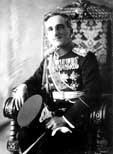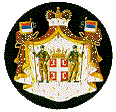King
Aleksandar I Karadjordjevic
|
ALEKSANDAR KARADJORDJEVICH Crown-prince (since 1909) Regent of Serbia (since 1914) Regent of the Kingdom of the Serbs, Croats and Slovenians (since December 1, 1918) King of Yugoslavia (1921-1934) |
|
|
Alexander Karadjordjevich was the second son of King Peter. He became the crown-prince in 1909, when his older brother George abdicated due to his illness. Alexander attended schools in Geneva, St Peterburg, Russia, and in Belgrade. He took part in the Balkan wars, as the nominal commander of the First Army. In 1014 he became the Regent of Serbia, and in World War I the Supreme Commander of the Serbian Army.
Since Serbia turned one of the winners of World War I, the Regent took advantage of the favourable political situation on the Balkans and in Europe, and proclaimed unification of Serbs, Croats and Slovenians into the joint Kingdom of SCS, on December 1, 1918.
There were two strong political currents in the country at the time: one was led by Nicholas Pashich and his radicals, and the other one by Regent Alexander. Both parties agreed upon the central system of ruling, but had opposing ideas about who would rule the country. Pashich and his followers pleaded for a parliamentary monarchy, while Alexander strove to strengthen his personal power.
On June 28,1921 the St Vitus Constitution was passed, giving Alexander a large authorization regarding administration and legislature. In August of the same year King Peter I died, and Alexander ascended the throne. His further movements represented a flagrant transgression of basic democratic rules: he passed the Document of declaration in 1920, Law of State Protection in 1921, and he eventually repealed the St Vitus Constitution, on January 6,1929 and imposed dictatorship, known as the sixth-of-January dictatorship. Alexander was shot on his official visit to Marseilles, on October 9, 1934. The assassins were members of VMRO, the Macedonian Liberation Revolutionary Organization, the aim of which was creation of Greater Macedonia, which should include the existing Macedonian territory plus parts of the territories of Greece, Albania and Bulgaria. Alexander was succeeded by his oldest son Peter. |
|


